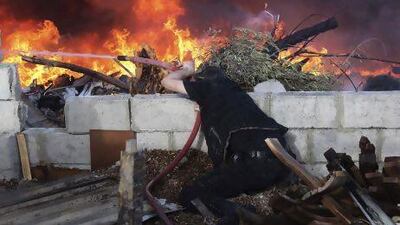When the first whispered news of street protests in Deraa began to circulate two years ago, Syrians stayed up all night glued to satellite television stations, desperate for information, the air thick with suspense, shock, hope and fear.
Was a revolution really beginning in that southern city or would Syria's decaying autocracy, a Gordian knot of a state carefully erected by Hafez Al Assad decades ago and maintained by his son, President Bashar Al Assad, quickly choke the unprecedented calls for political reform?
Today, as the uprising marks its second anniversary, that question at least has been answered. Many more remain unresolved.
Two years of grinding struggle and a deluge of unsubstantiated claims and counter claims about what is happening in Syria have stripped away the suspense and dulled the shock. The fear and uncertainty remain, however.
Rebel advances have been significant. The Syrian government is now unable to convincingly control numerous districts in and around Damascus, and has lost its hold over its first provincial capital, the eastern city of Raqqa.
But those gains have not yet proven decisive against a regime bleakly determined to hang onto power at any price.
All the while, the cost of the uprising has rapidly increased.
In the early days, most of the killing happened when security forces deliberately gunned down peaceful protesters during demonstrations held every Friday.
Those protests, with their demands for civil rights and their single to low double-digit death tolls, now seem naively optimistic and almost quaint. They were halcyon days, before the artillery barrages, air strikes, ballistic missiles, and the car bombs.
It says a great deal about how bad things have become that those first acts of murder appear, with hindsight, as minor spots of blood alongside the daily slaughter of the present.
The statistics speak volumes. More than 70,000 killed, according to the United Nations, and surely at least as many wounded (no one is counting, it seems), in addition to tens of thousands detained, kidnapped, tortured and disappeared, plus millions uprooted from their homes.
"Two years is a long time, we were not prepared for this and we still do not know how long it will all last," said a leading opposition activist in Damascus, heavily involved in clandestine humanitarian aid programmes in the Syrian capital.
Severe food and fuel shortages make it impossible for ordinary families to meet their basic day-to-day needs, he said, while aid efforts fell woefully short.
"The crisis will not end this year," he said glumly. "For Syrians, time means more suffering."
Splits in Syrian society have become more pronounced, especially along the sectarian fault lines dividing the ruling Alawite clans from the Sunni Muslim majority.
Although the revolt is more complex than that, these divisions have become more entrenched and fanaticism is in the ascendancy.
"Syrians will stand with President Bashar Al Assad until the end. We will not accept any leader other than Bashar, whatever that costs us," said Yara, a 35-year-old governmental worker, and an Alawite.
She dismissed suggestions the situation in Syria had anything to do with the need for political change after more than four decades of one-party, one-family rule and accused foreign-backed rebels of trying to impose a Taliban style regime on a "modern, moderate and secular" country.
"I believe that President Bashar and our Syrian Arab Army will defeat those killers and very soon we will announce our victory," she said. "But we are paying high price in the lives of our sons who are killed defending their country against this conspiracy."
Perhaps the only thing pro and anti-regime factions share is an unshakable belief in the inevitability of victory, each adamant history will vindicate their side. Both cannot be right.
Both can be wrong however, if Syria's war becomes one of those in which everyone loses and no one wins. The longer it drags on, the more it seems to be taking that shape.
"Certainly we will win even if we have to keep our revolution going for another ten years," said a 28-year-old, unemployed university graduate from Deraa, who took part in those early peaceful protests.
"The regime's men say 'Assad or we burn the country', we reply 'we will burn Assad and keep the country', whatever that will cost us in lives and property," he said.
Somewhere, wandering lost in the political wasteland between the two irreconcilable factions, is the remnants of what used to be called the 'silent majority', the vast bloc of ordinary Syrians who had neither taken up arms for the regime, nor against it.
Their silence and inaction, borne of justifiable fears and propagated by life in a political vacuum, appear to have condemned them to the role of passive victims.
"I have one wish, and that is to return to before March 15, 2011," said Abu Bashar, a retired teacher, 60, living in Barzeh, a suburb in northern Damascus.
"I want to go on a picnic with my family, to visit my sons anytime I want. I want to walk in Damascus at midnight without fearing that I will be arrested or killed. I want to reach Damascus' downtown in ten minutes not spending one hour on a checkpoint. I want to see my country stable and secure."
But no one, except perhaps the most deluded of regime hardliners, seem to believe the clock can be turned back completely.
Abu Bashar, the old teacher, added caveats to his own time-machine fantasy, belying the understandable nostalgia he feels for the pre-war days.
"I want my old Syria back but with democracy and freedom, and no power for the security services or the army, and to have a good income to live from," he said.
"Whoever can achieve these hopes and wishes, I will stand with him, but after all of this brutality, we need a new president. The people cannot accept Bashar Al Assad any more."
psands@thenational.ae
With reporting from two special correspondents in Damascus

